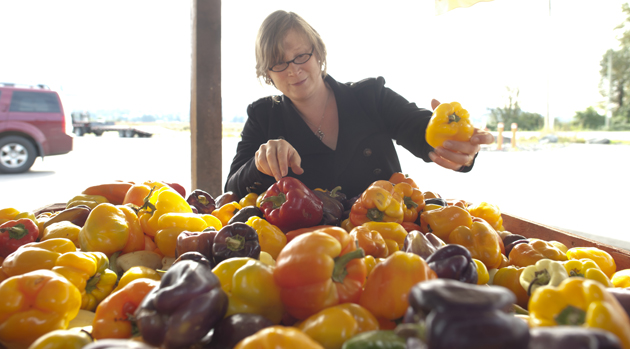Dr. Lenore Newman appointed Canada Research Chair at UFV
The University of the Fraser Valley has a new federally funded researcher on campus. Dr. Lenore Newman was recently appointed Canada Research Chair in Food Security and Environment and joins the Geography department at UFV. She will also be working closely with the UFV Agriculture department.
The Canada Research Chair program was established in 2000 with a goal of establishing 2,000 research positions across the country. It is part of a national strategy to prevent the ‘brain drain’ of Canada’s brightest researchers and make Canada one of the world’s top nations in research and development.
Newman will fill the second Canada Research Chair position at UFV. The first is held by professor Hugh Brody, a cultural anthropologist and filmmaker.
“Receiving funding for a second Canada Research Chair is a strong sign that the government of Canada recognizes that we are serious about research at the University of the Fraser Valley,” said UFV associate vice president of research and graduate studies Yvon Dandurand. “And the research that Dr. Newman will be doing is directly relevant to the interests of our region, which is in the middle of rich agricultural land yet also facing development pressures.”
Newman comes to UFV from Royal Roads University in Victoria, where was an assistant professor in the School of Environment and Sustainability, and head of the Master of Environmental Management program.
Her research interests include food security; sustainable food systems/urban food systems; place, space, and urban nature; and urban spatial geography.
Newman holds a PhD and a master’s degree, both in environmental studies, from York University, and a BSc (honours) in physics and astronomy from the University of British Columbia. She has travelled extensively and developed a strong interest in sustainability partly as a result of those travels.
As part of her appointment, Newman will be investigating Canada’s foodways, or how food defines Canadians and their culture. She will also be looking at environmental and social threats to food sustainability. The location of UFV in rural zone at the edge of a growing metropolis provides a perfect living laboratory for her research.
She says that there are three main threats to Canadian food sustainability: climate change, urban land pressures, and the disappearance of wild environments.
“Canada is a cold-defined nation, so any change to our climate will affect our foodways,” she notes. “And almost all of our good agricultural land is located right up against urban areas. Then we’re seeing the expiration of wild environments, and Canadian cuisine is one of the only cuisines largely grounded in wild foods such as salmon.”
As for what defines a Canadian cuisine, she says that it is based on wild foods and an enthusiastic integration of immigrant culture and foods.
“In the past, we’ve been hesitant to say that there is a definitive Canadian cuisine, but one is emerging, based on connection with wild foods, use of local ingredients, an incorporation of immigrant cuisine (in a huge way, from day one), and a focus on ingredients more than preparation. Canada is exploding with interest in food now. Our foodways got bland and unhealthy a few decades ago, but there is much more interest in eating local food and healthy eating now. It means we’ll pay more for food, but we’ll be healthier for it.”
Newman will be crossing the country finding “foods of locality”, talking to food producers and chefs, and recording her research through film and still photography, along with other methods.
“I’ll be looking at how foods help define a regional culture and really speak for a region.”
She will also be looking at the Fraser Valley and its connection to food production and the competing demands of agriculture, urbanization, and the wilderness needed to sustain wild foods such as B.C. salmon.
“The Fraser Valley is a fascinating region. It’s different from Vancouver but it’s changing rapidly. Abbotsford is one of those edge cities with typical post-modern development where you see farms, suburbs, and urban environments all intermingled. There are major tensions between farmers’ interests, encroaching development, and preserving the rivers that the salmon need to survive.”
She says that the collapse of a food source affects a region in many ways.
“When the cod fishery collapsed in Newfoundland, it wasn’t just a case of environmental and economic damage: entire communities and ways of life were wiped out. Just imagine our region without the salmon.”
In addition to her federally funded research activities, Newman will do some teaching and community volunteering as part of her UFV posting. She is currently teaching an introductory course in human geography and sitting on the board of the Abbotsford Agricultural Trust.
Although her studies and research have taken her across the country and she has travelled the world, Newman is a British Columbian at heart. She grew up in Roberts Creek on a Sunshine Coast and came from logging and fishing family.
Her research ties in nicely with a “deep foodie” enthusiasm for adventurous eating. She also enjoys travel, hiking, and mountain climbing, and spends much of her free time commuting on BC Ferries to see her partner, who is a researcher at the University of Victoria.
An activist for LGBT rights, she views the university environment as a place where “people can speak to each other and debate social issues and communicate without ripping each other apart.”
Media contact: Anne Russell
Cell: 604-798-3709
Office: 604-795-2826
anne.russell@ufv.ca






